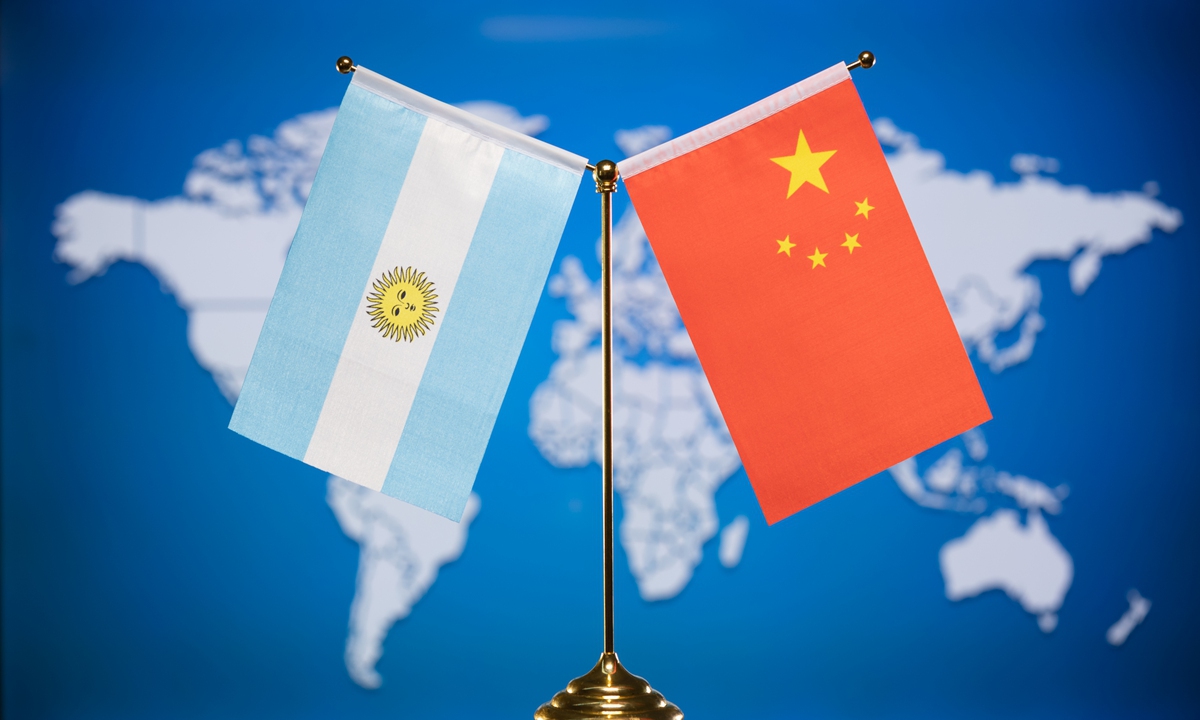GT Voice: Continuity in trade links will support China-Argentina ties ...
GT Voice: Continuity in trade links will support China-Argentina ties

National flags of China and Argentina Photo: VCG
After Javier Milei from the far-right Liberty Advances coalition won Argentina's presidential runoff on Sunday, the direction of Argentina's political and economic future has attracted great attention and triggered hot discussion. Amid the uncertainty, with its economy under severe pressure, it would be unwise for Argentina to alienate China economically.
Diana Mondino, Milei's principal adviser on foreign affairs, told Sputnik Brazil on Monday that Argentina would not proceed with plans to join the BRICS grouping. She also said that the country's government will "analyze" if joining the organization promises advantages.
As the invitation to join the BRICS grouping was just approved in August, these comments from a candidate for the post of foreign minister could be a signal of potential adjustment in Argentina's economic policy and political direction amid public opinion and pressure over a looming recession and rising poverty.
The potential policy uncertainty may cause some confusion or concern over the impact on Argentina's major trading partners in the short term, but given the momentum of economic ties between China and Argentina, the new situation will not and should not constitute an obstacle to bilateral cooperation.
In response to speculation on Argentina's future economic and trade relations with China, Chinese Foreign Ministry spokesperson Mao Ning said on Tuesday that the development of bilateral relations with Argentina had been showing good momentum. China is Argentina's second-largest trading partner and the largest agricultural export market.
The two countries have strong economic complementarities and huge potential for cooperation. China is willing to continue to work with Argentina to promote the stability and long-term development of bilateral relations.
Bilateral trade reached $19.8 billion in 2022, up 14.9 percent year-on-year, according to media reports. Argentina mainly exports agricultural products to China, while importing mechanical and electronic products and textiles.
Despite Argentina's trade gap with China, observers believe that their cooperation in lithium, natural gas and other energy fields has sufficient potential to reverse the trade balance.
For instance, Brazil runs a trade surplus with China through its iron ore exports, and Chile gains a trade surplus with China through copper resources.
Moreover, it is due to increasingly close bilateral ties that China has pledged a number of major investment projects in Argentina in recent years. In February 2022, Argentina joined the Belt and Road Initiative, which includes more than $23 billion in investment and cooperation agreements, covering such areas as green technology, scientific and technological innovation, infrastructure construction and agricultural cooperation. Infrastructure projects like dams and high-speed railway lines meet Argentina's development needs and strategic goals and also reflect China's friendship and support for the country.
On the financial cooperation level, a currency swap line with China helped Argentina avert a default with the IMF twice this year, according to media reports.
Apparently, the close economic, trade and investment relations between the two countries are of great significance to Argentina's economic and social development, whether it is promoting economic growth, creating jobs, upgrading infrastructure or expanding exports. This is also why even if there may be short-term political fluctuations in Argentina, it is still justified for the new government to ensure the fair treatment of Chinese investments.
Nevertheless, given the current circumstances, we must also take into account the risks that Chinese investment projects may face, and we have the right to demand that Argentina abide by agreements already signed by both sides and assume its responsibilities in accordance with the contracts.
The interests of Chinese companies should not be hurt because of a new government or political differences between the two countries. We believe that Argentina's new government will also realize the importance of bilateral economic and trade cooperation, which is conducive to the country's own development.
Even Milei said in August that he'd respect deals already signed in Argentina by Chinese companies, which include a contract to build twin dams in Patagonia and an agreement to set up a nuclear plant, according to Bloomberg.
Given the benefits of those investments and projects, there is every reason to believe the new president will honor the spirit of these contracts.









































